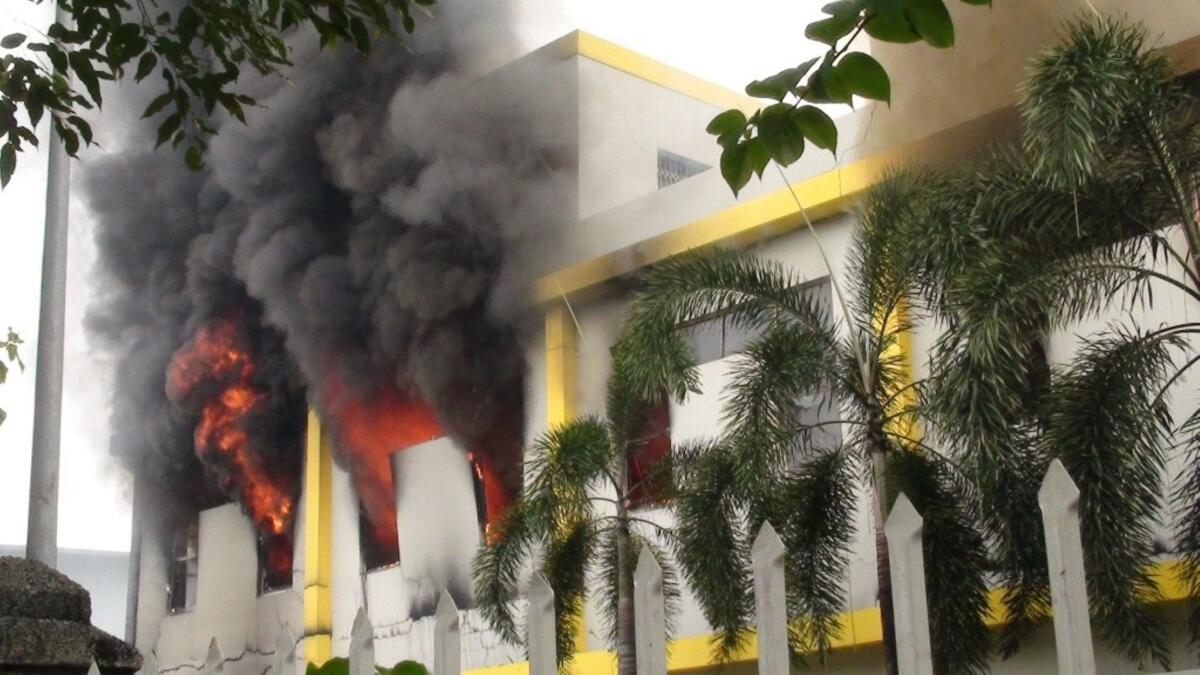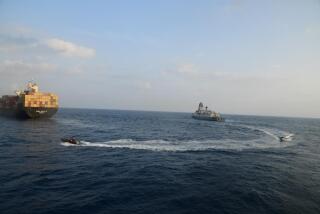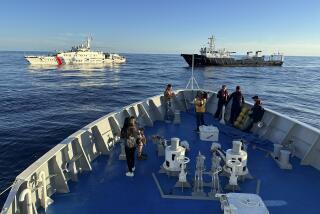Vietnam mobs torch foreign factories in anti-China protests

- Share via
Reporting from Beijing — Thousands of anti-China protesters ransacked, looted and set fire to foreign-run factories in southern Vietnam on Tuesday and Wednesday in a wave of violence sparked by a dispute over China’s placement of an oil rig in waters claimed by both countries.
The riots marked the biggest outburst of public unrest in tightly controlled Vietnam in recent years, experts said. Photos on local media websites and on social media showed thousands of protesters on foot and many on motorbikes waving Vietnamese flags; some local media accounts put their numbers at nearly 20,000.
At least 200 companies -- including many Taiwanese textile and clothing manufacturers apparently mistaken for mainland Chinese businesses -- had their facilities damaged, Chen Boxiu, chief of the Taipei Economic and Cultural Office in Ho Chi Minh City, said in a phone interview.
Affected companies included rubber firms, a bicycle maker and a scooter manufacturer. Japanese, Singaporean and South Korean enterprises in the area were draping their national flags at their gates in an effort to stave off attacks, but some were damaged. Some schools were closed, and police in riot gear were dispatched in an attempt to quell demonstrations.
More than 100 people had been arrested, said Chen, who added that his office had sent representatives to the airport to assist Taiwanese who wanted to evacuate.
The U.S. consulate-general advised Americans to avoid all protests and demonstrations in and around Ho Chi Minh City and Binh Duong province north of the city. Taiwan’s Foreign Ministry said it was sending two officials to Vietnam, and hundreds of Taiwanese businessmen were reportedly taking shelter in a hotel.
Singapore’s Foreign Ministry said it had summoned the Vietnamese ambassador to register its “serious concerns about the security situation” and had urged the government to “act immediately to restore law and order ... before the security situation worsens and investor confidence is undermined.”
Guo Yuting, manager of the Mira Hotel in Binh Duong City, said 240 Taiwanese citizens were taking shelter in his hotel. Many had been escorted by police from their besieged businesses, he said.
“Initially the protests were peaceful, but in the second and third waves, local mobsters joined in and things turned violent,” he said.
Protests have been building in Vietnam for days following China’s move to send a state-owned oil exploration rig into disputed waters near the Paracel Islands on May 1. Vietnam has dispatched several dozen boats in an attempt to disrupt the Chinese operations -- which may involve as many as 80 vessels -- and the two flotillas have clashed.
China claimed last week that Vietnamese ships had rammed Chinese vessels more than 170 times and that Vietnamese “frogmen” were spotted just yards from Chinese ships. Water cannons have also been deployed.
The U.S. has called the Chinese move “provocative.”
“This unilateral action appears to be part of a broader pattern of Chinese behavior to advance its claims over disputed territory in a manner that undermines peace and stability in the region,” State Department spokeswoman Jen Psaki said last week.
Carlyle Thayer, an emeritus professor at the University of New South Wales and an expert on Vietnam’s foreign affairs, called China’s dispatch of the oil rig “unexpected, provocative and illegal.” The timing was surprising, he said, given that last fall Chinese Premier Li Keqiang visited Vietnam and the two sides signed a host of agreements aimed at putting relations on an “upward trajectory.”
Thayer said China’s actions signaled a more aggressive posture in disputes with its Southeast Asian neighbors.
“Up to now with China, people have used the word ‘reactive’ -- it’s been responding to provocations, but this time, even the Chinese press ... has not used the justification that China has been poked in the eye and is responding to something. It’s showing an assertiveness, it’s not reactive, and that’s worrying. Now, it seems, China doesn’t need a provocation to do something like this.”
China said it has been in contact with Vietnam over the issue through “diplomatic channels,” but so far Beijing has refused Vietnam’s offer to dispatch a special envoy to discuss the situation.
China claims most of the South China Sea as its sovereign territory, putting it in conflict with not only Vietnam, but Malaysia, the Philippines, Taiwan and Brunei.
China maintains that the Paracel Islands, which it calls the Xisha Islands, are the “inherent territory” of China and that the drilling operation begun this spring is merely the continuation of 10 years of prior activity in the area. Beijing said it intends to keep the rig in the area until mid-August, when typhoon conditions will force it to be moved.
Thayer said it was likely Vietnam would continue to allow some protests to continue until Beijing accepts the idea of receiving a special envoy to discuss the rig. While describing the magnitude of the protests as “unprecedented” in recent years, he said Vietnam would likely bring a halt to demonstrations if they threatened high-profile facilities such as the Chinese Embassy or Consulate.
Jay Pan, 31, a hairdresser in Ho Chi Minh City whose parents emigrated from China, said by phone that police had set up checkpoints to prevent protesters from entering the city center. Although the oil rig might be the spark that set off these protests, Pan said some locals have long harbored resentment against China for a range of reasons. “There’s always a group of people in Vietnam who don’t like Chinese,” he said. “It’s not really about recent events.”
In an editorial on Wednesday, the Global Times, a newspaper with close ties to China’s Communist Party, chastised Hanoi, saying Vietnam was “messing around” and “attempting to make the dispute messier so more pressures will be imposed on China.”
The paper warned Vietnam and the Philippines -- which is engaged in its own territorial disputes with Beijing -- that China is playing a “long game” in the South China Sea and that they should think twice about expecting Washington to come to their aid.
“In order to maximize its interests, Uncle Sam uses the ‘rebalancing-to-Asia’ strategy to seduce Hanoi and Manila as its pawns,” the paper said. “China has every means to stop Hanoi and Manila’s provocations.”
Philippine authorities this week pressed criminal charges against nine Chinese fishermen who were detained last week in waters claimed by both countries. On Wednesday, Manila accused China of an illegal land-reclamation project on a partially submerged reef within its 200-mile economic exclusion zone.
Aerial intelligence showed construction activity on South Johnson Reef, also known as Mabini reef, Philippine officials told reporters in Manila. Some suggested that the Chinese might be building an airstrip.
The Philippines Department of Foreign Affairs said it had lodged a complaint with China about the construction on April 4 and that the Chinese rejected the complaint.
Tommy Yang and Barbara Demick in the Times’ Beijing bureau contributed to this report.
More to Read
Sign up for Essential California
The most important California stories and recommendations in your inbox every morning.
You may occasionally receive promotional content from the Los Angeles Times.











